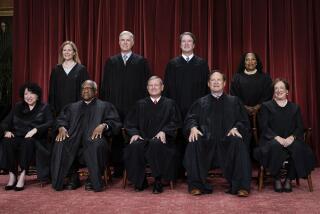Jurists’ Ties to Legal Publisher Under Scrutiny
MINNEAPOLIS — Supreme Court justices and federal judges nationwide ruled on cases involving a publishing firm that gave the jurists lavish trips and gifts, a newspaper reported Sunday.
The newspaper said the judges, who accepted luxury travel arrangements and other gifts from West Publishing Co. of Eagan, Minn., broke no laws. But, according to some ethics experts the newspaper contacted, the judges should have excused themselves.
The privately held company is a $600-million-a-year enterprise that has published the decisions of local courts and the Supreme Court since the turn of the century. Its specialty is organizing and numbering the material in such a way that lawyers and judges can easily find decisions and court opinions.
In a statement released Sunday, the company said the Minneapolis Star Tribune article “has about as much truth as the alien stories headlined in the supermarket tabloids.”
It said the “article follows the Star Tribune’s recent announcement that it will begin an on-line information service that will directly compete with West.”
According to the Star Tribune, at least seven justices (Sandra Day O’Connor, John Paul Stevens, Antonin Scalia and Anthony M. Kennedy and retired Justices Lewis F. Powell Jr., Byron White and William J. Brennan Jr.) and a number of federal judges took trips at West Publishing’s expense.
The trips were part of the selection of the annual Edward J. Devitt Distinguished Service to Justice Award, a $15,000 prize established by West Publishing in 1982 to honor an outstanding federal judge.
The excursions were often to luxurious resorts and entailed little work. The members of the award selection committee often actively involved themselves in the planning of the trip, the paper said.
The trips and other gifts, such as law books and entertainment at legal conferences, were given by West Publishing during the time that the company was busy defending its business in courts all over the country, with some cases reaching the Supreme Court.
Since 1985, two individuals, the state of Texas and electronic law information provider LEXIS-NEXIS have filed suit trying to break the company’s claim of copyright. All those cases were decided in West’s favor, decisions that were upheld on appeal.
The paper reported that West Publishing strongly denied it had done anything illegal and that the firm said it had followed all rules covering contacts with public officials.
More to Read
Inside the business of entertainment
The Wide Shot brings you news, analysis and insights on everything from streaming wars to production — and what it all means for the future.
You may occasionally receive promotional content from the Los Angeles Times.










